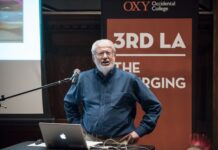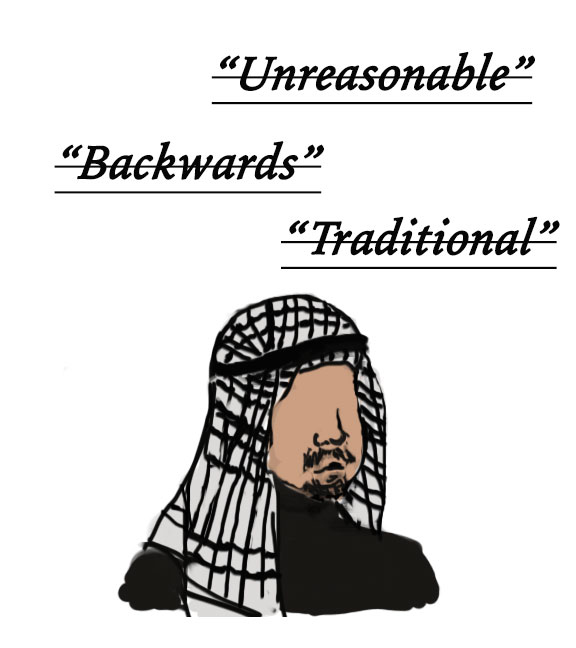President Donald Trump’s White House presented its “Middle East Peace Plan” Jan. 27, the finished product of a three-year process overseen by his son-in-law Jared Kushner. Calling for a united Jerusalem as Israel’s capital, the illegal assimilation of West Bank settlements and the formation of a Frankenstein Palestinian state subjugated to Israeli military power, it’s not shocking that Palestinian President Mahmoud Abbas rejected the plan with a “thousand no’s” (Abbas hadn’t been consulted anyhow). Nonetheless, Kushner accused the Palestinians of “screw[ing] up another opportunity like they’ve screwed up every other opportunity that they’ve ever had in their existence.”
The Trump White House’s enamorment with its own plan is not surprising. However, the plan had its share of cheerleaders in the media, too, including columnists at the New York Times.
Columnist Bret Stephens’ Jan. 30 piece — titled “Every Time Palestinians Say ‘No,’ They Lose” — is a prime example. Condescending that Palestinians must accept Trump’s peace deal lest “Palestinians again [let] history pass them by,” Stephens insists that the Palestinians could “learn” from an Israeli state that “has always been prepared to make do with less” (only Israel has gained territory over time).
Stephens’ conclusions are not particularly notable — there are valid arguments to be made for Israel’s existence and for the human rights of its citizens. What’s important here are the argumentative mechanisms Stephens employs, dehistoricizing the present and propagating simplified and charged representations of cultures and peoples.
Applying the sociological lens of Orientalism proves worthwhile here. First introduced by academic Edward Saïd, Orientalism describes the way Western knowledge producers, such as artists, writers and politicians, have created representations of an expansive “East” reliant on the imagery of exoticism, fanaticism and sensuality. Think snake charmers and magic carpets, barbaric kingdoms oppressing women and shedding blood; a spectacular West, a deviant East. The danger comes when those with power internalize these maligned characterizations — when these generalizations underpin popular entertainment, drive theories of war and conflict or, perhaps, inform New York Times coverage.
With this in mind, it becomes clear that Stephens spends far less time analyzing the particularities of policy (his Jan. 30 column contains one hyperlink to supporting sources) than he does diagnosing Palestinian psychology and culture. His condemnation of the Palestinians as a people “try[ing] to live history backwards” recalls the classic Orientalist distinction between a modern and rational West and a traditional and irrational East. His conflated descriptions of all Palestinian leaders as “cruel and cynical,” “kleptocratic and repressive” play to stereotypes. Frankly, the more time Stephens spends pontificating about “the disease of the Arab mind” compared to the “secrets of Jewish genius,” the less time he has to spend analyzing the complex histories of repeated failed negotiations or relativizing the massive power imbalance between a state with the world’s seventh-largest military per capita and the stateless people living under that military’s control.
This is the primary objective of Orientalism: to divorce the motivations of “Eastern” peoples (used ironically) from history or context. Palestinians couldn’t be angry about forced relocation, the expansion of settlements, Israeli violation of international law, the massive wall built inside their territory, the Israeli monopoly on water, the 705 permanent obstacles impeding movement in the West Bank, the demolition of over 27,000 homes since 1967, the 25,000 Palestinians injured by Israeli soldiers in 2018 or segregation in Jerusalem. No, they must be unreasonable. Stubborn. It’s because of their national psychosis. And suddenly, Palestinian resistance — violent and non-violent, political and cultural — loses any connection to historical grievances.
If Stephens were a New York Times outlier, there wouldn’t be much to worry about. He’s not. Celebrated new hire Bari Weiss consistently tirades against pro-Palestinian activists and protest movements. Legacy columnist Thomas Friedman has often commented on Palestinians’ “violent” tendencies, once suggesting that they should, instead, approach the Gaza wall with olive branches and signs. This is without even discussing the columnists’ track record on other matters of the “Orient,” such as the Iraq War. Then, they maligned Saddam Hussein and Iraqis as driven by the “tribal culture of the blood feud,” characterized the democratization of Iraq as a “noble” battle and justified military action as a lesson for Arab “young people who hate America.” These arguments are driven by nothing more than fear-mongering, condescension and dichotomies.
The New York Times has published well-researched and insightful op-eds on the Israel-Palestine conflict and the recent peace plan. But these op-eds usually come from outside contributors — not from the established, consistent and award-winning columnists backed by the paper. Far from recognizing this echo chamber, the New York Times congratulated itself on its 2017 hiring of Stephens, praising his “new perspective.”
There is nothing novel, diverse or divergent about hiring people who repeat talking points for those already in power. It’s not provocative; it’s cruel and redundant. This idea that Israelis and Palestinians are operating from the same starting line — and that Palestinians alone are hindering peace — is a fantasy. That the New York Times would continue to allow its propagation on its opinion pages — validating arguments driven by Orientalized stereotypes — is a disgrace to ethical journalism, only furthering violence, oppression and dishonesty.
Zach Goodwin is a junior Diplomacy & World Affairs (DWA) major. He can be reached at zgoodwin@oxy.edu.
![]()




































